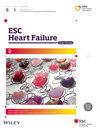Efficacy of ambulatory intravenous diuresis for chronic heart failure patients: Insights from the DEA-HF trial
Abstract
Aims
Oral diuretic treatment has limited efficacy in managing chronic heart failure (HF) patients. Novel strategies are needed to manage patients with refractory congestion despite optimal HF therapy and high-dose oral diuretic treatment. In the present study, we prospectively quantified the efficacy and safety of an ambulatory, weekly, high-dose parenteral diuresis strategy.
Methods and results
Data from the prospective, randomized, cross-over controlled study for comparisons of diuresis efficacy in HF patients (DEA-HF) were analysed. Chronic HF patients with congestion despite guideline-directed medical therapy were enrolled to receive three high-intensity diuretic regimens, once a week, in a randomized order: intravenous (IV) furosemide 250 mg; IV furosemide 250 mg + oral metolazone 5 mg; and IV furosemide 250 mg + IV acetazolamide 500 mg. The primary outcome compared the total sodium excretion following each diuretic regimen. Here, all regimens were pooled to assess the effect of weekly intensive diuresis approach on congestion parameters. The study population included 42 patients, 40% females, with a mean age of 72 ± 9 years. Following three consecutive weekly treatments, the mean body weight was decreased from 85.5 kg [95% confidence interval (CI): 79.7–91.2] to 83.1 kg (95% CI: 77.4–88.9. P = 0.0005), accompanied by a significant decrease in congestion score, N-terminal-pro-brain natriuretic peptide levels and lung ultrasound B-line count. Serum creatinine mildly but significantly increased from 1.81 mg/dL (95% CI: 1.62–2.01) to 2.01 mg/dL (95% CI: 1.81–2.21. P < 0.001), and no hospitalizations due to acute kidney injury occurred.
Conclusions
In patients with congestion-refractory HF, an ambulatory strategy utilizing high-intensity weekly IV diuretic therapy achieved effective decongestion without major safety concerns. This escalated strategy may improve clinical outcomes and prevent hospitalizations of chronic HF patients who require diuresis intensification.


 求助内容:
求助内容: 应助结果提醒方式:
应助结果提醒方式:


